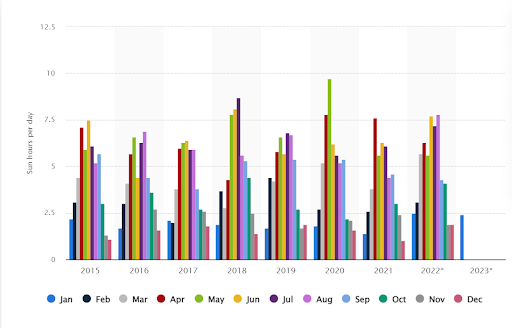Starting A Renewable Energy Business In The UK
29 Mar 2023

It’s an exciting time for the UK’s renewable energy market. Zero-carbon electricity production has now overtaken fossil fuels, and a combination of solar, wind, hydroelectric and bioenergy accounted for 36.3% of the country’s power.
Underpinning the rise of renewables is the UK’s commitment to achieving ‘net zero’ (carbon neutrality) by the year 2050 through emission reduction and removal. Simply put, conditions for investment in the renewable energy industry have never been more fertile.
Renewable energy companies are playing a key role in the ongoing energy transition, and their importance looks set to grow further as the net zero road map takes shape. So, as we envisage a groundswell of investment in the grassroots of renewables, how can these new energy businesses be launched and operated?
In this article, we’ll provide an overview of the renewable energy market in the UK, before pinpointing the challenges of starting a renewable energy business in the UK, highlighting financing options, and offering a high-level checklist for starting a renewable energy business.
Overview of the UK renewable energy market
Honing in on the current make-up of the UK’s low carbon and renewable energy industry - which generated a £41.2 billion turnover in 2020 alone – the market can be split into five major renewable energy niches:
- Solar photovoltaic (PV) technology
- Onshore wind
- Offshore wind
- Biomass / bioenergy
- Hydro
Together, these renewable energy sources account for 36.3% of electricity generation in the UK.
Government figures show that bioenergy generates the most power of any renewable source, with an 11.9% share of overall electricity generation in Q3 2022, followed by offshore wind (10.1%), onshore wind (7.3%), solar PV (6.2%) and hydro (0.9%). This pattern is unique to the UK, which proportionally generates far more energy from biomass than any other country, largely due to the conversion of Drax (one of the country’s largest former coal-burning plants), to biomass.
A reflection of the UK renewable energy industry’s growth is the new capacity that has been added between Q3 2021 and Q3 2022; 3.4GW, representing a 6.9% annual increase. Most of this new capacity has been added through offshore wind power generation.
To support the push towards net zero in 2050, the government launched the Contracts for Difference (CfD) scheme for new low-carbon electricity generation projects.
Now in its 4th round, the scheme is injecting £285 million per year in funding, with £200 million going to offshore wind, £75 million for emerging technologies including remote island wind and tidal stream, and £75 million for established renewable energy technologies like solar and onshore wind. In total, the round aims to secure 12GW of new capacity - more than the previous three years combined.
While solar PV contributes a modest share of overall renewable energy capacity, there has also been marked growth in this renewable energy niche. Record numbers of new solar PV installations have been recorded for the first time since the closure of the government’s Feed-in Tariff scheme (FITs) - which paid householders for the electricity generated by eligible systems – in 2021.
These record numbers are in part thanks to the breaking down of financial barriers, with more solar power project financing options available for entrepreneurs who are focused on starting a solar farm.
Challenges of starting a renewable energy business
Despite this being an opportune era for the sector, several challenges are presented to developers starting an energy business. These barriers to entry include:
- High upfront costs: The initial capital required to set up a renewable energy business can be intensive, with significant investment required across infrastructure, technology, legal, and technology.
- Project funding: Regardless of the renewable energy industry growing at a rapid rate, securing project funding is still one of the biggest challenges that budding entrepreneurs and businesses face. Platforms like PF Nexus’ renewable energy project marketplace are lowering the barrier of entry, connecting project owners and financiers across the globe.
- Regulatory hurdles: Depending on where a prospective renewable energy project is based, regulatory hurdles will exist. In the UK, there are several regulations and permits required to set up a renewable energy project, which can be time-consuming and expensive. Before embarking on any renewable energy project, it’s best to contact your local planning authority and do your research.
- Technical complexity: Aside from being expensive, renewable energy systems can be complex and require specialised technical knowledge to design, install, and maintain.
- Intermittency of renewable energy sources: Energy sources like wind and solar are intermittent and may be impacted by weather conditions, affecting generation capacity. In the case of the UK for instance, our climate offers 1403 hours of sunshine on average per year.
- Limited access to the grid: Certain locations across the UK may not always have access to the grid, which can increase costs in terms of solving the problem of how to distribute electricity generated. This is a serious consideration when selecting a location for your project. Advances in battery energy storage systems are helping to bridge this gap.
- Competition from established players: With renewable energy becoming increasingly more important, and generating it more accessible, the market is continually welcoming new entrants. Budding entrepreneurs and small businesses will face competition from competing SMBs and established developers.

Statista - Monthly Average daily sun hours in the UK
Renewable energy project financing options
The considerable hurdle of cost can be overcome with a range of financing options. Different types of financing options are suitable for different types of developers. Below, we put a spotlight on the main financing options for renewable energy businesses.
Self-financing
Self-financing is a common financing option for some new businesses, and 74% of entrepreneurs use personal savings as their primary financing source initially. However, the expense of starting a renewable energy project - for example, a 5-acre solar farm may cost upwards of £1 million - means that in this industry, the route can be fraught with risk, potentially jeopardising the assets of the business founder.
Bank loans/debt financing
Banks are another potential financing source but may be more suited for renewable energy companies that have already launched. This is because banks typically want to see evidence of significant growth potential before they are happy to arrange a loan.
Project financing
Project financing offers long-term finance for new renewable energy businesses, with repayments structured around the project’s projected cash flows. Project financing can be ideal for maximising the leverage of renewable energy projects, allowing restrictions binding sponsors (the executive in charge of the project) to be circumnavigated.
Due to its complexity and high cost in comparison with conventional financing routes, project financing may be most suited to larger utility projects in the private sector.
To find out more about project financing, take a look at our guide titled ‘Project Financing in Renewable Energy Project Development’.
Equity financing
Equity financing – that is, capital raised by selling shares to investors – negates the need to repay money to investors. If the company fails, the shareholders don’t get a return. Equity finance could be obtained through venture capital (from an investment fund) or angel investors (high-net-worth individuals using their own funds). This could be a good option for start-up renewable energy projects.
If you are in the process of raising capital for a renewable energy project, PF Nexus might just be the platform for you. Our renewable energy project marketplace provides project owners with access to potential investors and financial institutions seeking out project investment opportunities.
To find out more, sign up to our platform today.
Factors to consider when starting a renewable energy checklist
We conclude with a list of the key considerations when starting a renewable energy business:
- Market: A comprehensive analysis of the UK’s energy industry can help to minimise investment risk while identifying opportunities and threats. This important element of strategic planning will include an assessment of market size, trends, competitors, and potential areas for growth.
- Model: Defining the model of the company, from ownership to finance and operations. This also includes planning around relevant regulations and legal considerations.
- Operations: How will the company conduct its operations? An operations structure will include a plan for human resources, logistics, supply chain, and management tools used (such as software or online platforms).
- Budgeting: Financial projections will be key to defining budgets for the new company. Forecasting revenue, cash flow, and expenses can offer indicators such as how many sales are needed to cover costs and how much money is available for reinvesting in the business. Options for financing should also be determined.
- Risks: The identification and analysis of potential risks in all of the areas outlined above, including evaluation of options in the development of a risk management plan. Risks should be constantly monitored and reviewed.
Summary
So there you have it, starting a renewable energy business in the UK has its challenges but, it can be a highly rewarding venture for those that go the distance.
With the UK’s commitment to achieving carbon neutrality by 2050, the renewable energy market is set to grow dramatically, resulting in numerous opportunities for budding entrepreneurs and SMBs alike.
By understanding the market, identifying financing options suitable to your project needs, and compiling a robust operations and management plan, renewable energy businesses can overcome the challenges associated with renewable energy project development and play a key role in the ongoing energy transition.
To find out more about PF Nexus and how we are helping facilitate renewable energy project development around the world, get in touch today.
Sources: